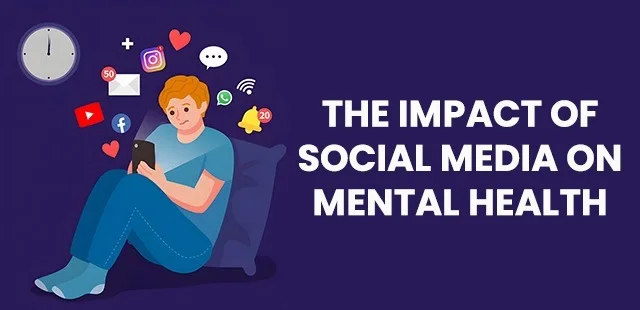Social media has become an integral part of our daily lives. From staying connected with friends and family to getting news updates and entertainment, it offers various benefits. However, as its influence grows, so does the concern about its impact on mental health. Studies have shown that excessive use of social media can lead to increased feelings of anxiety, depression, loneliness, and even low self-esteem.
The Dark Side of Social Media
- Increased Feelings of Anxiety and Depression Research has found that constant exposure to social media, especially platforms that showcase the “highlight reels” of others’ lives, can contribute to feelings of inadequacy and anxiety. Comparing yourself to the curated content of others can make you feel left out or like you’re not measuring up. Over time, this can lead to depressive thoughts and feelings of isolation.
- Negative Impact on Self-Esteem Many people, particularly teenagers, are vulnerable to low self-esteem due to the way they perceive themselves online. The pressure to present a “perfect” image—whether it’s through selfies, achievements, or lifestyle—can lead to unrealistic self-judgments and negative body image. This can exacerbate insecurities, leading to a decline in self-worth.
- Sleep Disruptions Social media can be a major culprit in sleep disturbances. The blue light emitted from screens interferes with the production of melatonin, a hormone that regulates sleep. This, combined with the mental stimulation from scrolling through social media late at night, can disrupt sleep patterns, leading to fatigue and mood swings.
- Fear of Missing Out (FOMO) The phenomenon of FOMO is closely tied to social media. Constantly seeing posts about friends attending events, vacations, or experiences that you weren’t part of can trigger feelings of exclusion and disappointment. This feeling can lead to social anxiety and increased dissatisfaction with one’s own life.
How a Mindful Approach Can Mitigate the Negative Effects
- Setting Boundaries with Social Media A key step in managing the negative effects of social media is setting healthy boundaries. You can do this by limiting the amount of time you spend on social platforms and avoiding mindless scrolling. Consider designating specific times to check social media instead of allowing it to consume your entire day.
- Practice Digital Detox Regular digital detoxes are essential for mental well-being. Taking breaks from social media—whether it’s for a day, a weekend, or even a week—can help you reset and reduce feelings of overwhelm. During this time, engage in offline activities like reading, spending time in nature, or practicing mindfulness.
- Engage in Mindful Scrolling Instead of mindlessly scrolling through feeds, practice mindful scrolling. Before you open a social media app, set an intention. For example, you might decide to only interact with posts that make you feel positive or engage with content that inspires or educates you. By being intentional, you can avoid the trap of endless scrolling that leads to negative emotions.
- Be Aware of Your Emotional Reactions Pay attention to how certain posts or interactions make you feel. When you notice feelings of jealousy, anger, or sadness, take a moment to pause and reflect on why you feel that way. Are the emotions triggered by comparisons? Are they a result of external validation? This awareness can help you take a step back and decide whether to continue engaging with that content.
- Follow Accounts That Uplift and Inspire Curate your social media feed with accounts that promote positivity, mental well-being, and self-improvement. Follow people, brands, or organizations that align with your values and inspire you. This will ensure that your social media experience is enriching and supports your mental health rather than detracting from it.
Benefits of a Mindful Social Media Approach
- Improved Mental Health By being intentional with social media, you can reduce stress, anxiety, and depression. Setting boundaries and following positive accounts can increase feelings of self-worth and satisfaction. A mindful approach allows you to consume content that uplifts you and brings you joy, rather than content that fuels negativity or comparison.
- Better Relationships Social media can be a great tool for staying connected, but it’s important to engage in a mindful way. By reducing distractions and being fully present in conversations, you can build stronger, more meaningful connections online. Practice mindful engagement by leaving thoughtful comments, sending direct messages that promote positivity, or simply taking the time to connect with loved ones.
- Enhanced Self-Awareness Mindfulness helps you develop a deeper understanding of your emotions and reactions. This self-awareness extends to your social media habits, allowing you to identify when social media use is negatively affecting your well-being. It empowers you to make conscious choices about your online activity.
Mindful Practices for a Healthier Social Media Experience
- Mindful Breathing Before Scrolling Take a deep breath before you start scrolling to center yourself and check in with your emotional state. This simple practice can help you create a sense of calm and intention before diving into social media.
- Gratitude Practice After Social Media Use After spending time on social media, take a moment to reflect on three things you’re grateful for. This practice helps you shift your focus from any negative feelings triggered by social media to a more positive and grounded mindset.
- Engage in Offline Activities Balance your time online by engaging in offline activities like reading, exercising, cooking, or spending quality time with friends and family. These activities can help create a healthy balance and allow you to recharge.
Conclusion
Social media can be a double-edged sword—it has the power to connect and inspire, but it also has the potential to negatively impact our mental health. By practicing mindfulness, we can mitigate the harmful effects of social media and use it in a way that supports our well-being. By setting boundaries, curating a positive feed, and being present with our emotions, we can create a more mindful and balanced social media experience.



